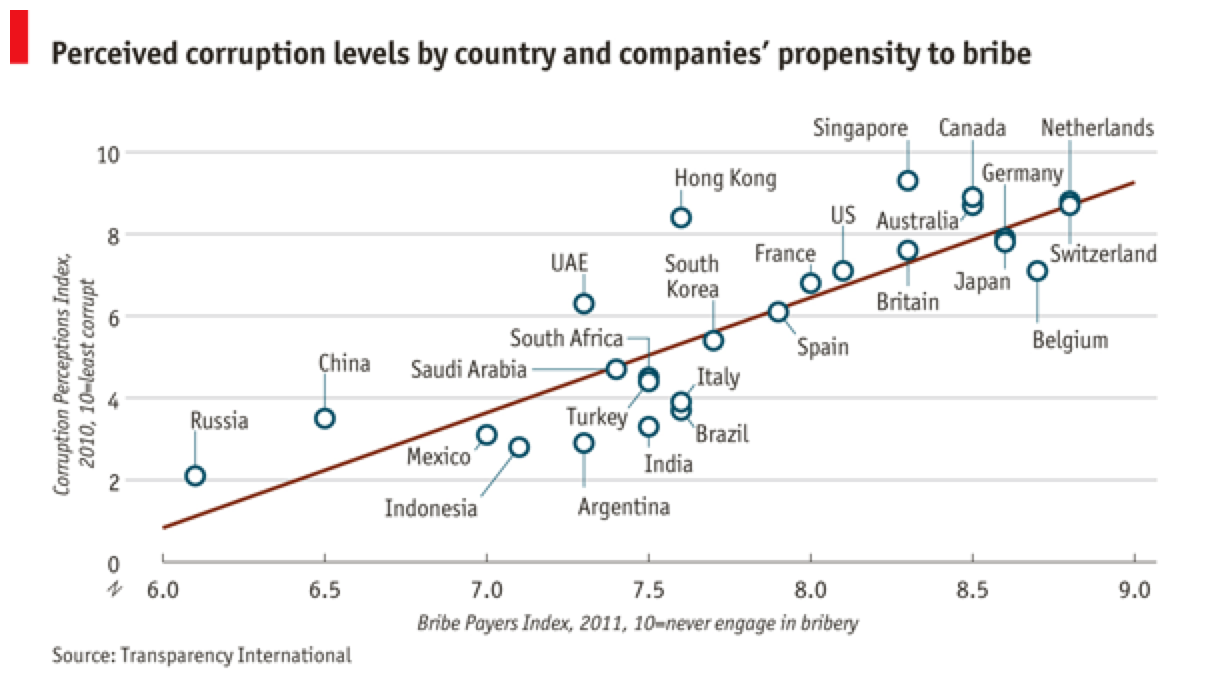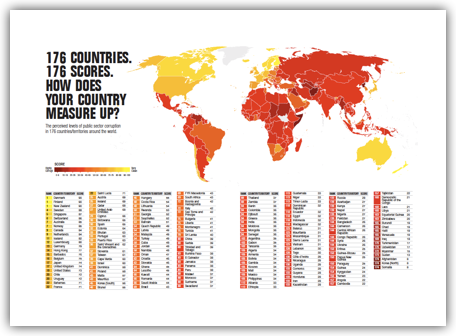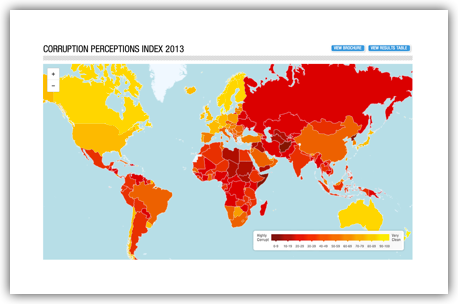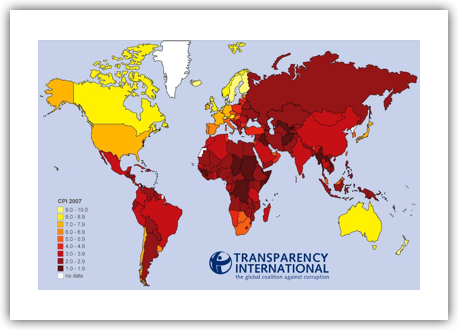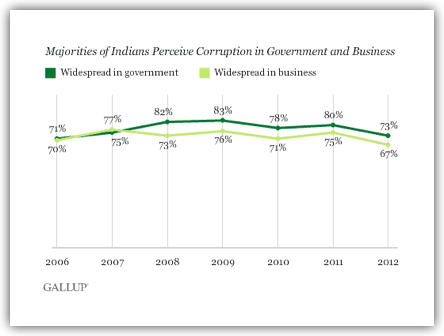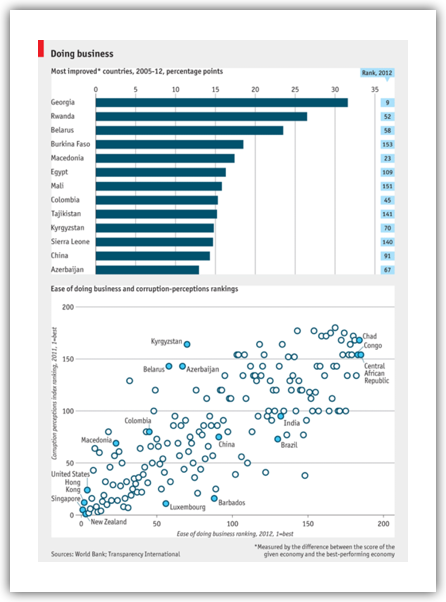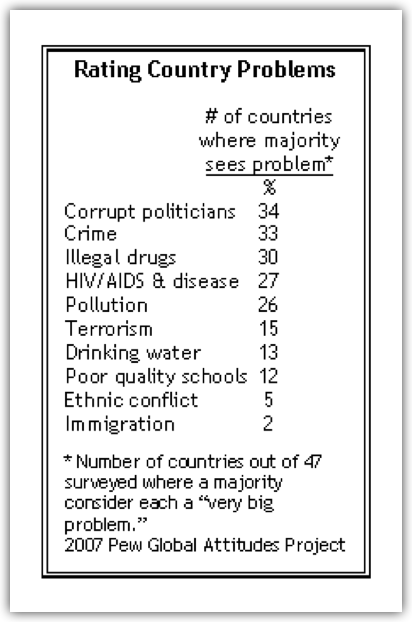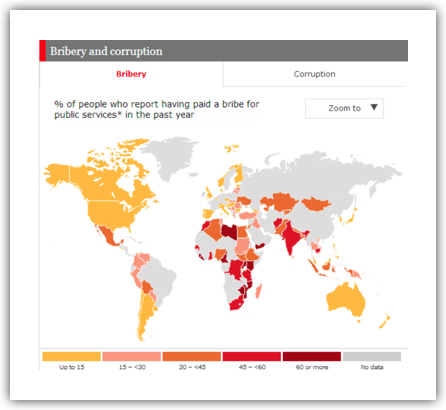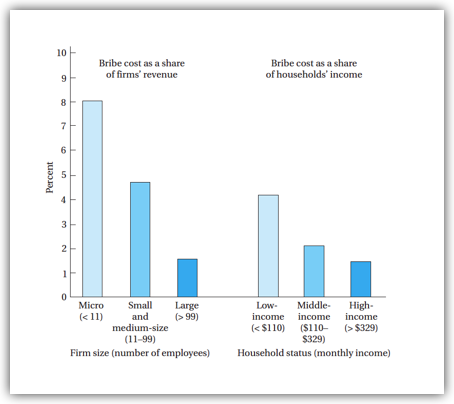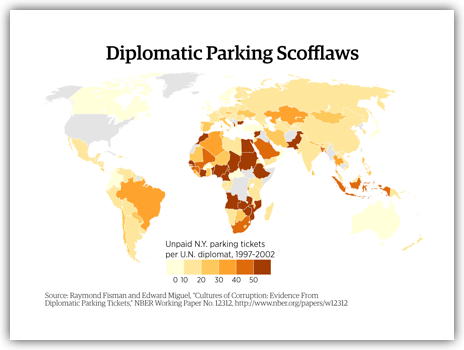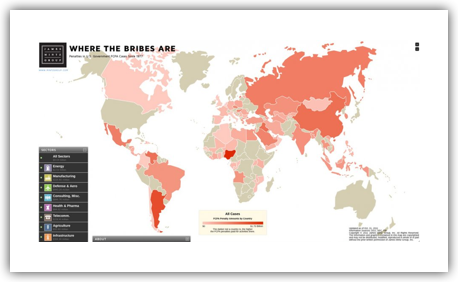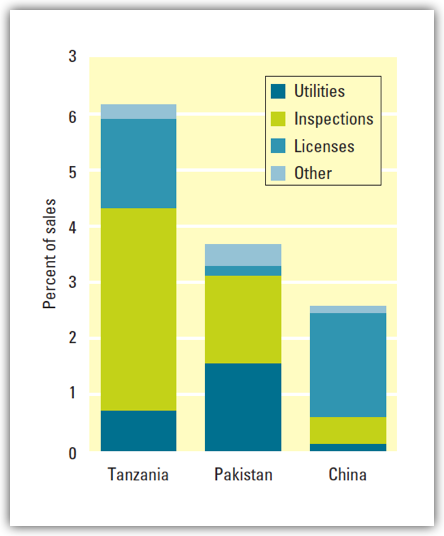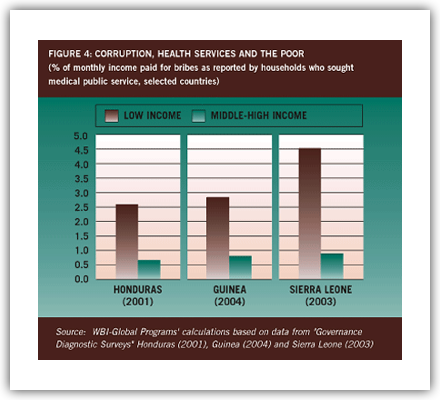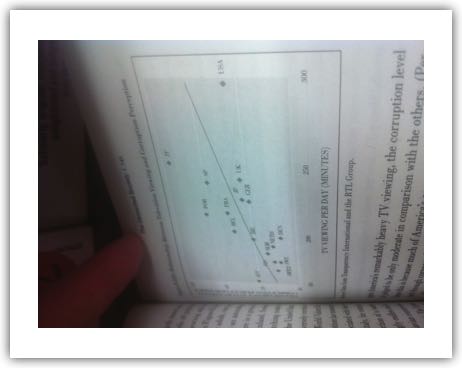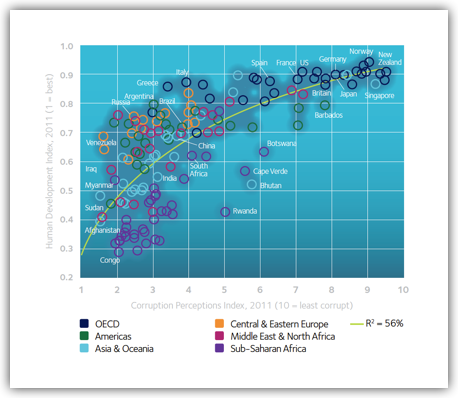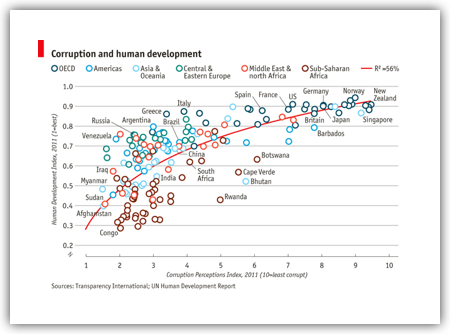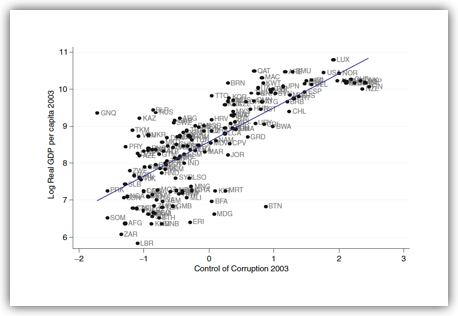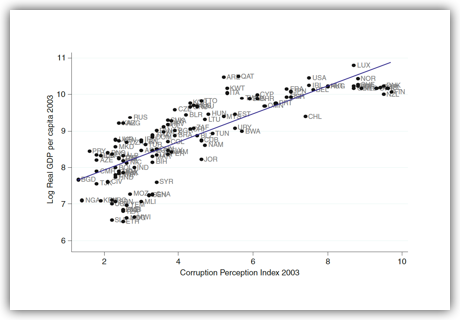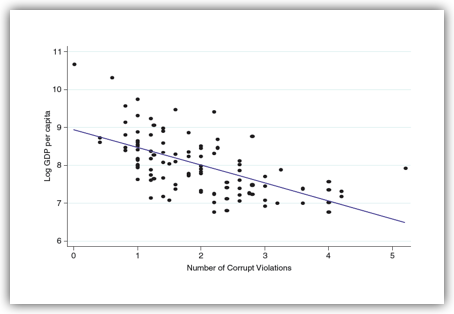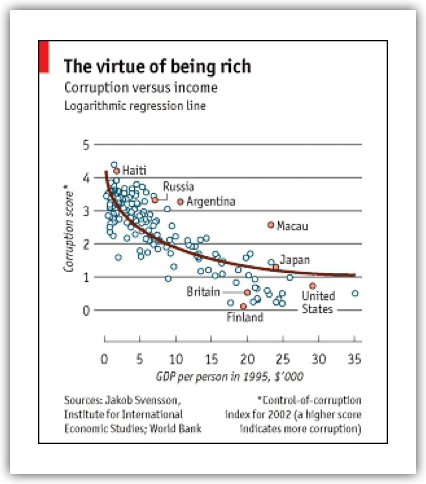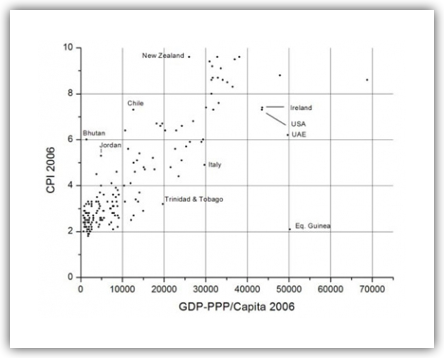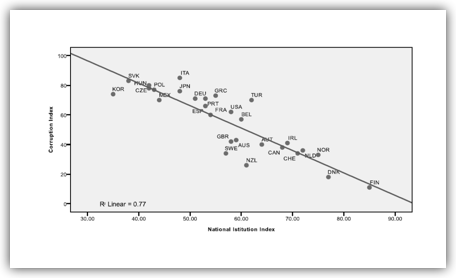
|
 |
 |
  | IMPORTANT RESEARCH PAPER –– Andrei Shleifer and Robert W. Vishny – Corruption
The Quarterly Journal of Economics (1993) 108 (3): 599-617 doi:10.2307/2118402
|
 |
 |
 |
 |
  | World Map – World Corruption Index
|
 |
 |
 |
 |
  | Transparency International's World Corruption Perception Index for 2012 -- Reddit
|
 |
 |
 |
 |
  | Map: The most- and least-corrupt countries in the world
|
 |
 |
 |
 |
  | World Map CPI (Corruption Perception Index of Transparency International) in 2013
|
 |
 |
 |
 |
  | World Map CPI (Corruption Perception Index of Transparency International) in 2007:
|
 |
 |
 |
 |
  | Gallup data on perception of corruption in India
|
 |
 |
 |
 |
  | Transperency vs Ease of Doing Business
|
 |
 |
 |
 |
  | Corruption is perceived as a serious problem in many countries - Pew
|
 |
 |
 |
 |
  | DATAVIS Interactive World Map of Corruption and Bribery
|
 |
 |
 |
 |
  | Corruption as a Regressive Tax: The Case of Ecuador – Todaro & Smith (2011)
|
 |
 |
 |
 |
  | Source: World Development Report, 2000–2001: Attacking Poverty, by World Bank, p. 102, fig. 6.2. Copyright © 2000 by World
Bank. Reproduced with permission.
|
 |
 |
 |
 |
  | Map of Countries with the Most Violations of Bribery
|
 |
 |
 |
 |
  | World Map of Diplomatic Parking Scofflaws 1997-2002
|
 |
 |
 |
 |
  | Accountability and openness
|
 |
 |
 |
 |
  | Global Integrity Report measuring mechanisms that fight corruption
|
 |
 |
 |
 |
  | Ähnliche Daten: Wieviele haven I'm letzten Jahr bestochen? (Demokratien wenig / and ere hooch): In which countries do members of the public frequently pay bribes? Bribery: Something for your troubles | The Economist
|
 |
 |
 |
 |
  | WorldMap US Government FCPA Cases since 1977
|
 |
 |
 |
 |
  | Corruption in the public and private sectors go together - Bribe Payers Index – The Economist
|
 |
 |
 |
 |
  | Corruption in the public and private sectors go together - Bribe Payers Index: International back scratching | The Economist
|
 |
 |
 |
 |
  | TABLE Bribes vary by firm size, sector, and region – World Development Report (2005)
|
 |
 |
 |
 |
  | Source: World Bank Investment Climate Surveys, and WDR Surveys of Micro and Informal Firms.
|
 |
 |
 |
 |
  | Rights and Permissions
The material in this publication is copyrighted. Copying and/or transmitting portions or all of this work without permission may be a violation of applicable law. The International Bank for Reconstruction and Development / The World Bank encourages dissemination of its work and will normally grant permission to reproduce portions of the work promptly.
For permission to photocopy or reprint any part of this work, please send a request with complete information to the Copyright Clearance Center Inc., 222 Rosewood Drive, Danvers, MA 01923, USA; telephone: 978-750-8400; fax: 978-750-4470; Internet: www.copyright.com.
|
 |
 |
 |
 |
  | BARCHART The main locus of bribe-taking can vary – World Development Report (2005)
|
 |
 |
 |
 |
  | Note: Countries selected to illustrate variations. “Other” includes
construction permits and government contracts.
Source:World Bank Investment Climate Surveys.
|
 |
 |
 |
 |
  | Rights and Permissions
The material in this publication is copyrighted. Copying and/or transmitting portions or all of this work without permission may be a violation of applicable law. The International Bank for Reconstruction and Development / The World Bank encourages dissemination of its work and will normally grant permission to reproduce portions of the work promptly.
For permission to photocopy or reprint any part of this work, please send a request with complete information to the Copyright Clearance Center Inc., 222 Rosewood Drive, Danvers, MA 01923, USA; telephone: 978-750-8400; fax: 978-750-4470; Internet: www.copyright.com.
|
 |
 |
 |
 |
  | Corruption is costly to the poor (% paid in bribes)
|
 |
 |
 |
 |
  | Corruption does not only slow down economic development and per capita GDP growth – it’s a burden on the poor. Bribes put low income families under a lot of financial strain:
|
 |
 |
 |
 |
  | Correlates, Determinants, & Consequences
|
 |
 |
 |
 |
  | Importance of the media for the exposure of corruption
|
 |
 |
 |
 |
  | Correlation TV Viewing & Corruption perception from Jeffrey Sachs Price of Civilization
|
 |
 |
 |
 |
 |
  | Correlation TV Viewing & Corruption perception from Jeffrey Sachs Price of Civilization.jpg
|
 |
 |
 |
 |
  | SCATTER Global corruption and human development, 2011 – Oxford Martin School (2013)
|
 |
 |
 |
 |
  | SCATTER Corruption and human development (HDI)
|
 |
 |
 |
 |
  | Prosperity and Corruption
|
 |
 |
 |
 |
  | PAPER: Giorgio d’Agostino, J. Paul Dunne, Luca Pieroni – Government Spending, Corruption and Economic Growth
|
 |
 |
 |
 |
  | Highlights
•
Analyse the direct impact of corruption on economics growth using a very large sample of countries and find it to be negative.
•
Analyse how corruption can also interact with other forms of government spending to influence growth.
•
Find important complementarities between military spending and corruption that compound their negative impact on growth.
•
Find that combating corruption will have not only positive direct effects but also important indirect effects.
|
 |
 |
 |
 |
  | RESEARCH PAPER Paolo Mauro (1995) – Corruption and Growth
The Quarterly Journal of Economics (1995) 110 (3): 681-712 doi:10.2307/2946696
|
 |
 |
 |
 |
  | SCATTER Income and control of corruption – Rodrik & Rosenzweig (2010)
|
 |
 |
 |
 |
  | [ref]This is taken from a chapter in Dani Rodrik & Mark R Rosenzweig (2010) - Handbook of development economics. Volume 5. Elsevier. North-Holland.
[/ref]
|
 |
 |
 |
 |
  | SCATTER Income and corruption perceptions – Rodrik & Rosenzweig (2010)
|
 |
 |
 |
 |
  | [ref]This is taken from a chapter in Dani Rodrik & Mark R Rosenzweig (2010) - Handbook of development economics. Volume 5. Elsevier. North-Holland.
[/ref]
|
 |
 |
 |
 |
  | SCATTER Corruption and income across Brazilian municipalities – Rodrik & Rosenzweig (2010)
|
 |
 |
 |
 |
  | [ref]This is taken from a chapter in Dani Rodrik & Mark R Rosenzweig (2010) - Handbook of development economics. Volume 5. Elsevier. North-Holland.
[/ref]
|
 |
 |
 |
 |
  | SCATTER Corruption over GDP per capita
|
 |
 |
 |
 |
  | SCATTER Corruption over GDP per capita
|
 |
 |
 |
 |
 |
  | Corruption Perception Index? probably
|
 |
 |
 |
 |
  | Institutions and corruption
|
 |
 |
 |
 |
  | Correlation between National Institutions index and corruption index in 28 OECD countries
|
 |
 |
 |
 |
  | Source: Gallup World Poll, Year 2007
|
 |
 |
 |
 |
  | – – – – – – – – – – – – – – – – – – – – – – – – – – – – – – – – – – – – – – – – – – – – – – – – – – – – – – – – –
|
 |
 |
 |
 |
  | Measurement, Data Quality & Definitions
|
 |
 |
 |
 |
  | Die weltweiten Daten erstellt Transperency International aber die Methodologie ändert sich von Jahr zu Jahr (!!!! - steht hier) und macht Veränderungen nicht feststellbar. Hier sind die Daten und eine Darstellung dieser auf einer Weltkarte: Corruption perceptions: The usual suspects | The Economist
|
 |
 |
 |
 |
  | – – – – – – – – – – – – – – – – – – – – – – – – – – – – – – – – – – – – – – – – – – – – – – – – – – – – – – – – –
|
 |
 |
 |
 |
  | DATA Annual data on 'Informal payments to public officials (% of firms)' [by country] is available in the World Development Indicators (WDI) published by the World Bank (here).
|
 |
 |
 |
 |
  |
Informal payments to public officials are the percentage of firms expected to make informal payments to public officials to "get things done" with regard to customs, taxes, licenses, regulations, services, and the like.
|
 |
 |
 |
 |
  | FROM A ALESINA PAPER: Control of Corruption: The control of corruption index is "capturing perceptions of
the extent to which public power is exercised for private gain, including both petty and grand
forms of corruption, as well as capture of the state by elites and private interests." The stan-
dardized index which corresponds in 2000 ranges from
2:5 to +2:5 with lower values indicating
a higher degree of corruption. Source: World Bank Governance Matters Indicators Database
(Kaufman, Kraay, and Mastruzzi (2005)). available at: http://info.worldbank.org/governance/wgi/index.asp
|
 |
 |
 |
 |
  | DATA The Munich based CESifo Group – consisting of the Center for Economic Studies (CES), the Ifo Institute – is making data on 'Freedom from Corruption (Index of Economic Freedom), 1995 - 2013' available here in the Institutional Comparisons Database (DICE). This data can be downloaded or visualised online at their website.
|
 |
 |
 |
 |
  | DATA The Munich based CESifo Group – consisting of the Center for Economic Studies (CES), the Ifo Institute – is making data on 'Control of Corruption (Worldwide Governance Indicators), 1996 - 2011' available here in the Institutional Comparisons Database (DICE). This data can be downloaded or visualised online at their website.
|
 |
 |
 |
 |
  | DATA The Munich based CESifo Group – consisting of the Center for Economic Studies (CES), the Ifo Institute – is making data on 'Corruption Perceptions Index, 1995 - 2012' available here in the Institutional Comparisons Database (DICE). This data can be downloaded or visualised online at their website.
|
 |
 |
 |
 |
  | DATA Corruption data: Global Advice Network (funded by the Governments of Austria, Denmark, Germany, Netherlands, Norway, Sweden and the UK) provides the Business Anti-Corruption Portal, intended as information source for SMEs operating in developing countries. Within the 'Country Profiles' you can go to the 'Sources' page to pick out a wealth of WEF, Transparence Intl., World Bank, etc. reports and (importantly) also (micro-)data such as enterprise surveys with relevance for corruption and investment/business climate.
|
 |
 |
 |
 |
  | International Country Risk Guide (ICRG)
Data on corruption with the following variables: Socioeconomic Conditions, Investment Profile, Government Stability, Rescaled External, Conflict Risk (0-10), Corruption [0,6], Military in Politics, Religion in politics, Law and Order Tradition, Ethnic Tensions, Democratic Accountability, Quality of Bureaucracy. For further information see The PRS Group website.
The Corruption Perception Index (CPI)
The CPI ranks more than 150 countries by their perceived levels of corruption, as determined by expert assessments and opinion surveys. The survey is published annual by Transparency International.
|
 |
 |
 |
 |
  | World Bank: Governance & Anti-Corruption Data
A site with links to datasets with disparate types of governance variables, presentational charts, maps, tables and statistical information.
|
 |
 |
 |
 |
  | DATA The Global Competitiveness Index
TI - Corruption Perceptions Index
TI - Global Corruption Barometer
|
 |
 |
 |
 |
  | – – – – – – – – – – – – – – – – – – – – – – – – – – – – – – – – – – – – – – – – – – – – – – – – – – – – – – – – –
|
 |
 |
|
 |
